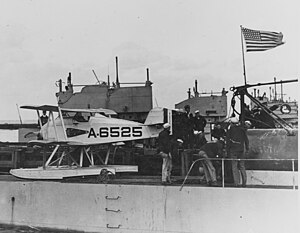Martin MS
| MS-1 | |
|---|---|

| |
| A Martin MS-1 on USS S-1 in 1923 | |
| Role | Submarine-operated scout biplane |
| Manufacturer | Glenn L. Martin Company |
| First flight | 1923 |
| Introduction | 1923 |
| Primary user | United States Navy |
| Number built | 6 |
The Martin MS-1 was an experimental scout biplane ordered by the United States Navy and was intended to operate from a submarine. It first flew in 1923 and the type was used for tests until 1926 when the project was cancelled.
Development
Following World War I, the U.S. Navy Bureau of Aeronautics conducted studies concerning the possibility of submarine-borne observation and scouting aircraft. After surfacing, this plane should be rolled out and quickly assembled. It was planned to launch the seaplane by ballasting the submarine until the deck was awash. The Navy ordered two types of aircraft, the Martin MS-1, constructed of wood and fabric, and the all-metal Cox-Klemin XS. The MS-1 first flew from Lake Erie in early 1923.[1]
Operational history
The submarine S-1 became the experimental platform for the operation of scout seaplanes late in 1923. The MS-1 and the Cox-Klemin XS were used for the trials, mounted in a cylindrical pod behind the conning tower. The first successful attempt was made on 5 November 1923. The first full cycle of surfacing, assembly, launching, retrieving, disassembly, and submergence took place on 28 July 1926, on the Thames River at New London, Connecticut using the XS-2.[2]
A total of six Martin MS-1s were built, with all six still being listed with the U.S. Navy as late as 1926. After further trials during 1926, all the experimental aircraft were scrapped.
Variants

- MS-1
- six built (BuNo A6521-A6526).
Operators
Specifications
Data from [1]
General characteristics
- Crew: one
- Length: 18 ft 1 in (5.50 m)
- Wingspan: 18 ft 0 in (5.34 m)
- Height: 8 ft 0 in (2.38 m)
- Empty weight: 650 lb (295 kg)
- Gross weight: 1,007 lb (456 kg)
- Powerplant: 1 × Lawrance L-4 , 60 hp (44 kW)
Performance
- Maximum speed: 100 mph (161 km/h, 87 kn)
- Range: 200 mi (320 km, 170 nmi)
- Service ceiling: 8,500 ft (2,590 m)
See also
Aircraft of comparable role, configuration, and era
Related lists
References
- ^ "Pro Resin 1/72 Martin MS-1, previewed by Scott van Aken". Archived from the original on 2011-08-28. Retrieved 2011-09-22.
- ^ "S-1". Archived from the original on 2010-12-08. Retrieved 2011-09-22.
Bibliography
- Passingham, Malcolm (February 2000). "Les hydravions embarqués sur sous-marins" [Submarine-carried Seaplanes]. Avions: Toute l'aéronautique et son histoire (in French) (83): 7–17. ISSN 1243-8650.